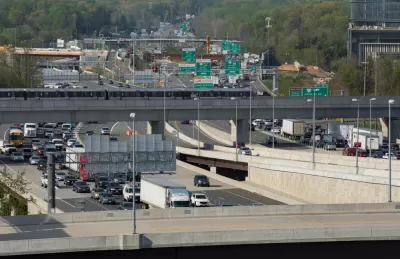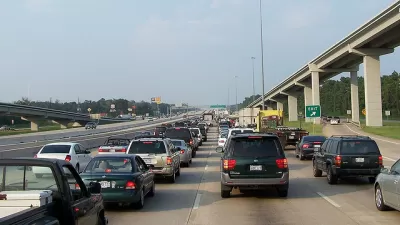A study by David C. Phillips, associate professor of economics at the University of Notre Dame, reveals hiring prejudice against people who would have to commute farther to work, in addition to bias against people with "black sounding" names.

"Low-wage employers in Washington, D.C., discriminate against applicants with longer commutes and those with stereotypically “black” names," reports Denise-Marie Ordway, previewing a study [pdf] forthcoming in the Journal of Human Resources.
"The study finds that when presented with otherwise similar resumes, hiring managers who are trying to fill a position that requires only a high school diploma are less likely to call back applicants who live farther away. Applicants from distant communities get 14 percent fewer callbacks than those living nearby," according to Ordway.
The finding about a preference for hiring people with shorter commutes is separate from the study's other finding: that people with stereotypically black sounding names are also less likely to receive hiring call backs.
The author of the story, David C. Phillips, views these findings as likely to mirror similar realities in other cities. "[Phillips] suggests that policies aimed at moving lower-income adults closer to jobs or better public transportation systems may improve their chances of securing work," according to Ordwell. The article also clearly stands the new study in contrast to a 2007 study by scholars at the National Bureau of Economic Research and Harvard University finding that "public housing residents did not improve their work status after moving to higher-income areas."
Phillips also presents these findings as troubling in light of an increasing super commuters and low-income populations moving farther afield in metropolitan areas, drastically increasing commute trip lengths in the demographic.
The new study also isn't the first to find evidence of bias against super commuters. A Planetizen blog post by Shane Philips from February 2014 details the findings and implications of similar analysis conducted at Xerox Services.
FULL STORY: Some employers discriminate against applicants with longer commutes

Alabama: Trump Terminates Settlements for Black Communities Harmed By Raw Sewage
Trump deemed the landmark civil rights agreement “illegal DEI and environmental justice policy.”

Planetizen Federal Action Tracker
A weekly monitor of how Trump’s orders and actions are impacting planners and planning in America.

The 120 Year Old Tiny Home Villages That Sheltered San Francisco’s Earthquake Refugees
More than a century ago, San Francisco mobilized to house thousands of residents displaced by the 1906 earthquake. Could their strategy offer a model for the present?

In Both Crashes and Crime, Public Transportation is Far Safer than Driving
Contrary to popular assumptions, public transportation has far lower crash and crime rates than automobile travel. For safer communities, improve and encourage transit travel.

Report: Zoning Reforms Should Complement Nashville’s Ambitious Transit Plan
Without reform, restrictive zoning codes will limit the impact of the city’s planned transit expansion and could exclude some of the residents who depend on transit the most.

Judge Orders Release of Frozen IRA, IIJA Funding
The decision is a victory for environmental groups who charged that freezing funds for critical infrastructure and disaster response programs caused “real and irreparable harm” to communities.
Urban Design for Planners 1: Software Tools
This six-course series explores essential urban design concepts using open source software and equips planners with the tools they need to participate fully in the urban design process.
Planning for Universal Design
Learn the tools for implementing Universal Design in planning regulations.
Clanton & Associates, Inc.
Jessamine County Fiscal Court
Institute for Housing and Urban Development Studies (IHS)
City of Grandview
Harvard GSD Executive Education
Toledo-Lucas County Plan Commissions
Salt Lake City
NYU Wagner Graduate School of Public Service





























